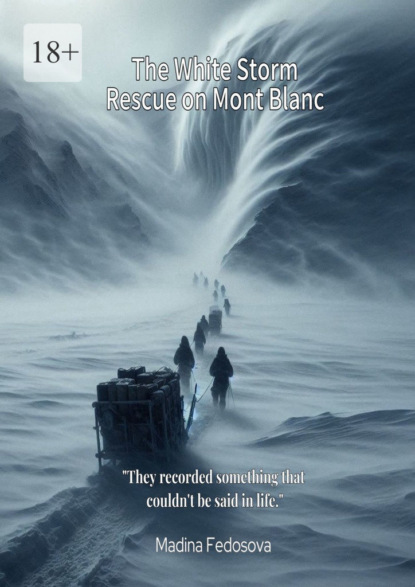The White Storm Rescue on Mont Blanc

- -
- 100%
- +
“Five countries,” he thought, looking at the child’s drawing. Yes, from the summit of Mont Blanc, you could indeed see five countries. But the most important things always remained invisible to the eye – the unspoken words, the promises he had made to himself ten years ago, standing over the crevasse where Javier had remained forever.
And now, with a child’s drawing in his pocket and twenty-three letters in his backpack, he was going back to that mountain – not for triumph, but for forgiveness.
Barcelona El Prat Airport. Terminal 1. 9:30 p.m.
The departure lounge resembled a huge aquarium – the cold light of fluorescent lamps reflected off the polished granite floors, creating a sense of unreality. The air was thick with a mixture of aromas – pungent coffee from a nearby café, the sweet smell of freshly baked croissants, and the acrid note of disinfectant used to wipe the plastic chairs. Somewhere in the distance, a steady hum of voices could be heard – a blend of Spanish, Catalan, and a dozen other languages merging into a single background noise.
Alejandro walked slowly through the duty-free corridor, his hiking backpack with climbing gear softly tapping against his back. Shop windows gleamed with chrome surfaces, offering last-minute purchases before the flight. In one of them, filled with rows of perfume bottles, stood a young saleswoman. Her dark hair was gathered in a careless bun, and a compass tattoo – a meticulously detailed instrument with a needle pointing strictly northwest – adorned her wrist.
“Looking for a gift?” she asked before Alejandro could open his mouth. Her voice sounded tired, but laughter hid in the corners of her brown eyes. “For a woman or for yourself?”
Alejandro set his backpack on the floor, feeling his back muscles tense after a long wait in the check-in line. His gaze slid over the shelves of bottles, stopping at one – simple, unadorned, with a white label.
“Choosing a classic scent,” the saleswoman stated, taking out the bottle. “Interesting, why this one?” She turned the bottle in her hands, and the light from the lamps reflected in the glass. “That’s a rather rare choice for a man.”
“My wife…” Alejandro hesitated, adjusting his backpack strap, “…she has loved this scent since we met at university. The chemistry lab smelled exactly like this – jasmine and… something else.”
The saleswoman smiled, and the piercing in her eyebrow glinted:
“Did you know this fragrance has a note of alpine flowers? Edelweiss, to be precise.” She carefully wrapped the bottle in gift paper with a delicate pattern of flowering branches. “In Switzerland, they believe these flowers bring luck to travelers.”
Outside the terminal, a plane’s engine roared to life. Alejandro mechanically pulled a crumpled child’s drawing from his pocket – a blue mountain and two figures on the summit. The saleswoman noticed the movement.
“For your daughter?” she asked, tying the ribbon on the package.
“For my wife.” He put the package in the side pocket of his backpack, where a stack of letters in blue envelopes – one for each day of his absence – already lay. “Just in case.”
The girl froze for a moment, her fingers with chipped blue polish lingering on the bow.
“My father…” she began quietly, “…he was a fisherman. Every time he went to sea, he left us letters like that. Mom said it was his way of staying close, even when…” She didn’t finish, handing Alejandro a small sample. “Take it. A new fragrance – smells like rain and chestnuts. For… difficult days.”
The board flashed with a message about boarding for the flight to Lyon. Alejandro nodded in thanks and turned to leave, but the girl called out to him:
“Señor!” She pulled a small silver bell from under the counter. “In the Pyrenees, shepherds hang these on their sheep so they don’t get lost in the fog.” She handed him the bell. “Take it. For luck.”
Alejandro took the bell. With a slight movement, it produced a clear, high sound, strangely contrasting with the airport’s hum.
“Thank you,” he said. “But in the mountains, we have our own bells. They hang on alpine trails so you don’t lose your way during a blizzard.”
He left the store, heading for the gate. In his backpack pocket were twenty-three letters, a bottle of perfume, and a child’s drawing. His face – tired, with a shadow of unspoken thoughts in the corners of his eyes – was reflected in the glass door. Behind him, a soft chime sounded – the saleswoman had hung the bell above the cash register, where it would ring every time the shop door opened and closed, seeing off and greeting those who left and returned.
Oslo, Norway. Central Station. 7:17 p.m.
The winter evening enveloped the platform in thick, bluish fog mixed with plumes of diesel smoke from the arriving train from Bergen. Eivind Larsen walked slowly along the slippery platform, his heavy mountain boots with deep tread leaving clear prints in the thin layer of wet snow. The air was saturated with the characteristic smells of a major transport hub – acrid diesel exhaust, the sweetish smoke from a grill selling pork sausages at the east exit, and the sharp scent of pine garlands decorating the station columns for the approaching Christmas.
He stopped in front of a 24-hour newsstand, where the bright fluorescent light pulled the covers of glossy travel magazines and neat stacks of fresh newspapers, fanned out, from the semi-darkness. Inside, it smelled of fresh printer’s ink, overbrewed coffee from a machine in the corner, and the faint aroma of pine resin from Christmas cards featuring views of the fjords.
“Afterposten,” Eivind said to the cashier, a young guy with faded tattoos on his tanned arms – stylized Viking longships that had blurred over time into blue smudges more reminiscent of children’s scribbles than fearsome ships.
The cashier, chewing gum, looked up from his phone screen and appraised the tall man in a worn mountain jacket:
“Third one today,” he said, handing over a fresh issue with a headline about new oil fields in the North Sea on the cover. “You a collector? Or just really into economic news?” The guy was clearly looking for a reason to talk, bored at the empty register during the evening shift.
Eivind silently took change from his pocket. The coins clinked onto the glass counter, covered in a thin layer of dust and fingerprints.
“Souvenirs,” he muttered, avoiding direct eye contact. “For friends abroad. They like… Norwegian newspapers. Especially the crime section.”
The cashier snorted, running his hand over his tattoos, where the once-proud ships were barely discernible:
“Yeah, especially the notes on page 24, right?” He deliberately turned the newspaper over, opening the crime section, and tapped a small article in the corner with a fingernail bitten to the quick. “All foreigners suddenly get interested in our ‘missing persons’ right before a trip to the mountains. Strange coincidence, don’t you think?”
Eivind jerked his head up. His fingers involuntarily clenched the newspaper, wrinkling the glossy paper. On the indicated page, there was indeed a tiny article: “Climber missing on Trollveggen. Search called off due to deteriorating weather.” A black-and-white photo showed a young man in climbing gear – if one didn’t know it was a five-year-old picture, one might mistake him for Eivind himself. The same square jaw, the same light eyebrows, slightly raised in surprise.
“You…” the cashier frowned, peering at the customer. “Wait a minute…” He grabbed his own copy of the paper from the counter, then looked at Eivind again. “Good God, you’re his brother! That Larsen, who…”
The station loudspeaker blared an announcement about the arrival of a train from Trondheim, giving Eivind a chance not to answer. He quickly shoved the newspapers into the side pocket of his backpack and rushed for the exit, leaving a few extra kroner on the counter.
Out in the cold air, he was enveloped again by the familiar smell of fried onions from the hot dog stand. Eivind stopped, inhaling this simple, mundane aroma, so distant from the clean, thin air of the high mountains, where his brother had remained five years ago. He took out the newspapers and, without looking, shoved them into an overflowing trash can by the metro entrance. The paper landed softly at the bottom, joining other fragments of everyday life – tickets, receipts, chocolate bar wrappers.
Somewhere in the distance, the bells of the city cathedral rang, striking seven times. Eivind adjusted the straps of his heavy backpack and strode toward the station exit, where an old blue bus to the suburbs was waiting – the very route he and his brother had taken every summer as children to their grandfather’s fishing village on the fjord. Now he was going there alone – to the old house where two photos in identical frames still stood on the mantelpiece: one of him and his father on the summit of Galdhøpiggen, the other of his brother on that last day before setting out for Trollveggen.
Fjell & Fjord Bar. 9:55 p.m.
The dim light of kerosene lamps barely pierced the dense veil of tobacco smoke shrouding the low-ceilinged room. The air was thick with a mixture of scents – juniper schnapps, cured reindeer meat, and the wet wool of jackets hung by the entrance. On the walls, covered in dark wood paneling, hung dozens of yellowed photographs: snow-capped peaks, frozen waterfalls, smiling faces against mountain ridges.
Eivind sat in his usual spot at the counter, where the wooden surface was carved with names and dates – a kind of chronicle of the establishment’s patrons. His fingers slowly traced the rim of a massive glass, leaving wet marks on the worn wood.
Torgeir, the bar owner, a former rescuer with frostbitten ears and a nose resembling a potato after a long winter, set a new glass of clear liquid in front of him.
“You look worse than my first sleeping bag after a polar expedition,” he rasped, wiping his hands on a greasy apron. “And you smell about the same. When was the last time you slept?”
Eivind looked up at a photo behind the counter – a group shot from 1993 where the “Bald Troll” team stood on the summit of Galdhøpiggen. Everyone was laughing, hugging, except for one man in the corner – his father, looking into the distance with the same expression Eivind now had on his face.
“Thanks for the concern,” he muttered, taking a sip of the strong drink. The alcohol’s sharpness burned his throat but couldn’t overpower the constant metallic taste that had haunted him since the day of that avalanche.
Torgeir leaned closer, and Eivind caught the familiar smell – a mix of cheap soap, heather smoke, and something else he always associated with childhood.
“You don’t drink before climbs,” the old man said quietly. “Never. Even when we celebrated your father’s conquest of Trolltinden, you refused a sip at sixteen. What’s changed?”
Eivind took a crumpled envelope, yellowed at the edges, from his inner pocket. Inside was a charred corner of a photograph – all that remained of the family album after that fire. On the surviving fragment, only a hand in a red glove was visible, gripping an ice axe with the engraving “M.L.” – Magnus Larsen.
“I’m not going on a climb,” he said, examining the burnt edges of the photo. “I’m going to retrieve what’s left. His gear. His notes. His…” his voice broke, “…his body, if I’m lucky.”
Torgeir slowly exhaled, and his breath, smelling of mint gum and alcohol, mixed with the smoke filling the bar.
“It’s been five years, boy. Do you really think that…” he fell silent, seeing the look on Eivind’s face.
Laughter came from a corner of the bar where a group of young climbers was celebrating a successful ascent. Someone started singing an old Norwegian mountain song but quickly fell silent under Torgeir’s heavy gaze.
“You know what they say about Trollveggen,” the old man whispered, pouring himself a drink. “Even rescuers don’t go there after October. The glacier there… it’s alive. It moves, it breathes. And it doesn’t like its dead being disturbed.”
Eivind unfolded a map in front of him – covered in notes, with areas circled in red and strange, almost mystical symbols in the margins.
“I found his diary,” he said, pointing to one of the marks. “He didn’t just fall. He found something there. Something that…” Eivind’s fingers clenched the edge of the map, “…something that made him go back there alone.”
Torgeir studied the map carefully, then suddenly grabbed Eivind’s wrist. His fingers, despite his age, were strong as climbing carabiners.
“You want to repeat his route? Alone? In January?” There was something more than just concern in the old man’s voice.
The bar fell silent, broken only by the crackling of firewood in the fireplace. Torgeir looked long at the photo behind the counter where a young Eivind stood next to his father and brother, then slowly pulled a small silver bell from under the counter – the kind hung on sheep in the mountains.
“Take it,” he croaked. “On Trollveggen, the fogs are so thick you can’t see your own hands. If… if you ring it, maybe someone will hear.”
Eivind took the bell, and its chime mixed with the sound of the opening door – new visitors entered the bar, bringing with them the smell of snow and the promise of new stories. But his story was already written – on the charred mantelpiece.
Lyon – Saint-Exupéry Airport. Terminal 3. 11:40 p.m.
Alejandro was waiting for his luggage at the carousel when an announcement came over the loudspeaker:
“Mesdames et messieurs, en raison d’une alerte à la bombe…” (Ladies and gentlemen, due to a bomb threat…)
People began to fuss. Someone dropped a suitcase.
“¡Mierda!” (Shit!) He reached for his backpack – first aid kit, letters for Luisa, the perfume…
And then he saw him.
A tall blond in a black Helly Hansen windbreaker stood by the exit, not moving, as if the storm warning didn’t concern him. Their eyes met.
The Norwegian.
That one.
Chapter 2
Shadows of the Past
Bilbao, Spain. Deusto District. 6:30 a.m.
(The day before departure)
Morning in Bilbao began with a sea breeze that crept through the narrow streets of the Deusto district, rustled the curtains on the windows, and left a salty film on the lips. Alejandro Gutiérrez stood by the window, listening to the city waking up – a bakery door slammed downstairs, a garbage truck’s brakes screeched, bottles clinked in the bar across the street. He closed his eyes, inhaling this familiar chaos, and suddenly caught himself memorizing it – the sound, the smell, the feeling – as if afraid he might never hear it again.
“Mountains do not forgive those who come to them with a heavy heart,” he recalled the words of the old Basque guide who had taken him on his first hikes.
On the windowsill lay a notebook – worn, with a faded “Refugio de Góriz” sticker. He opened it to the last pages, where instead of the usual notes about routes and gear, there were neatly numbered letters.
“Dear Luisa…”
The first letter. For the first day of his absence.
“If you are reading this, it means I have been delayed in the mountains a little longer than planned. Don’t worry – mountains, like people, sometimes test our strength. But know this: even if I don’t return on time, I will return. You remember how we played ‘climbers’ on the sofa? You said you were afraid of heights, but you climbed after me anyway because ‘daddy won’t leave me.’ Well, I won’t leave you either. Never.”
His hand trembled, and an inkblot spread across the paper like a small, dark cloud.
“Your letters again?”
Carmen’s voice sounded sharp behind him, but there was no anger in it – only weariness.
“Just notes for Luisa,” he replied without looking up.
“In case of what?”
She opened the refrigerator sharply, taking out the milk. The bottle clinked against the glass shelf.
“In case I…”
“In case you what?”
He silently pulled a clipping from El Mundo from his pocket – yellowed with time. “Tragedy on Monte Perdido: Two Climbers Dead, One Missing.” In the corner of the newspaper was his own photograph, taken the day before his partner, Javier, fell into a crevasse.
“You think I don’t know why you write these letters?” Carmen’s voice trembled. “You’re preparing not to come back. Like then.”
“He who fears death is already half dead,” he whispered the old Basque saying.
“What?”
“Nothing.”
He closed the notebook and stuffed it into his backpack, where twenty envelopes – one for each day of his absence – already lay.
Luisa dragged him by the hand across the schoolyard, which smelled of wet asphalt and frying oil from the cafeteria.
“Dad, look!” she poked her finger at a display of children’s drawings. Her work – a bright blue mountain with tiny figures on the summit – hung next to abstract scribbles.
“That’s you and me on Mont Blanc!” Luisa jumped with delight.
Alejandro felt something cold tighten around his throat.
“Ma petite,” he bent down, adjusting her bow, “remember our game? If I get delayed in the mountains…”
“…I have to open one letter a day!” the girl rolled her eyes. “Dad, you promised it was just an adventure.”
“Adventure is just danger we have agreed to,” he wanted to say but remained silent.
In his jacket pocket was a train ticket to Barcelona. There was no return ticket.
Oslo met Eivind Larsen with cold rain and the smell of fried sausages from street stalls. He walked along Thorvald Meyers gate, where laughter and music came from every other window. Everything here was the same as five years ago – the same signs, the same smells, the same people.
Only his brother was missing.
He stopped at house No. 45—an old brick building with peeling paint. A light was on on the third floor – as if someone was waiting for him.
The apartment smelled of mold and dust. Photographs hung on the wall in the hallway:
– 1998. Him and Magnus on the summit of Store Skagastølstind. Both laughing.
– 2005. The “Ice Ravens” team at the Trollstigen Pass.
– 2017. A clipping from Dagbladet: “Tragedy on Trollveggen: One Dead, Two Missing.”
Eivind walked over to the old oak table, where the only remaining item lay – a charred ice axe with the engraving “M.L. – Min bror” (M.L. – My brother).
“Death takes the body, but not the memory,” he whispered.
When the evacuation was announced at Lyon airport, Alejandro looked up for the first time that day and saw him.
Tall. Fair-haired. With eyes the color of Norwegian ice.
The Norwegian stood motionless, as if all this chaos – shouts, running, sirens – was happening in another dimension.
Their eyes met.
“Gutiérrez?” the Norwegian’s voice sounded hoarse, as if he hadn’t used it in a long time.
Alejandro nodded.
“Larsen.” The man showed a charred piece of a photograph. “We’re going for the truth.”
Thunder rumbled in the distance.
Chapter 3
The Road to the Clouds
Lyon’s Part-Dieu station greeted them with a gray dawn and the echoing sound of voices under high arched vaults. Alejandro squinted from the bright light of the schedule board, where red lines kept rearranging themselves like soldiers before inspection. “Chamonix Express – delay 42 minutes” – the electronic letters flashed with irritating regularity. Somewhere deep in the station, the wheels of luggage carts clattered loudly, and from the Paul bakery came the sweet aroma of freshly baked croissants, mixing with the acrid smell of bleach used to wash the floors in the morning.
He settled on a cold metal bench next to an elderly couple in matching bright red jackets – typical German pensioners, judging by their broken French and huge backpacks with “Deutscher Alpenverein” tags. Three benches away, a young mother in a worn-down puffer jacket was unsuccessfully trying to calm a crying baby, rhythmically rocking a stroller with a peeling Air France sticker.
“Did you know that seventeen people died building the Mont Blanc tunnel?” a familiar hoarse voice suddenly sounded. Eivind stood before him with two paper cups from which thick steam rose. His ice axe, leaning against his shoulder, gleamed in the artificial light of the station lamps. “The Italians and the French argued about the drilling direction for three years. They met with a deviation of only 13 centimeters.”
Alejandro automatically took the cup, feeling the heat through the thin cardboard. The coffee was strong, without sugar – exactly how he always drank it.
“How did you…”
“Guess?” the Norwegian sat down next to him, and the bench slightly sagged under his weight. “At the airport, you ordered a ‘doppio espresso, nothing else.’ A curious habit for a Spaniard.” He took a sip and winced. “Though after a night in this city, even your god-awful ‘borcha’ would taste like nectar.”
The loudspeakers suddenly crackled to life, making the German in the red jacket flinch. “Attention, mesdames et messieurs. En raison des conditions météorologiques défavorables…” – a female voice sounded unnaturally cheerful, announcing canceled flights to the Alps.
“Bad weather?” Alejandro raised an eyebrow, watching a conductor in a worn blue uniform methodically making his rounds, clicking his punch. “In June?”
Eivind silently pulled a smartphone from his pocket and showed the latest forecast: *"Storm warning. Avalanche risk – 65%. Wind up to 90 km/h.”*
“Perfect conditions to find what’s been hiding in the mountains for decades,” he whispered, adjusting the strap of his backpack with a faded Norsk Tindeklub patch.
When their train finally arrived, the third-class carriage greeted them with the smell of old wood paneling, oil paint, and someone’s cheap perfume. The conductor, with a face resembling a dried pear, muttered “Vos billets, s’il vous plaît” without even looking at the passengers.
Alejandro settled by the window, watching the first sun paint the alpine meadows golden. Down below, tiny houses with smoke from chimneys flashed by, herds of cows looking like insects, and suddenly – a sharp turn, and a panorama of snow-capped peaks opened before his eyes.
“First time seeing the Alps in summer?” Eivind didn’t look up from the map where several points were circled in red marker.
“Second. In 2018…”
“Javier Mendoza, thirty-four years old,” the Norwegian unexpectedly finished for him, running his finger over one of the marks. “Fell into a crevasse on the north face. The search was called off after three days due to a snowstorm.” He turned the page, showing a clipping from Le Dauphiné Libéré. “The body was never found.”
Конец ознакомительного фрагмента.
Текст предоставлен ООО «Литрес».
Прочитайте эту книгу целиком, купив полную легальную версию на Литрес.
Безопасно оплатить книгу можно банковской картой Visa, MasterCard, Maestro, со счета мобильного телефона, с платежного терминала, в салоне МТС или Связной, через PayPal, WebMoney, Яндекс.Деньги, QIWI Кошелек, бонусными картами или другим удобным Вам способом.


